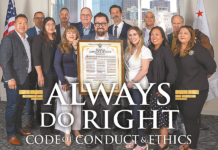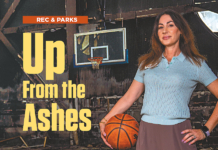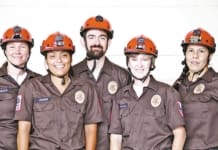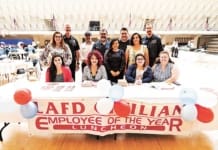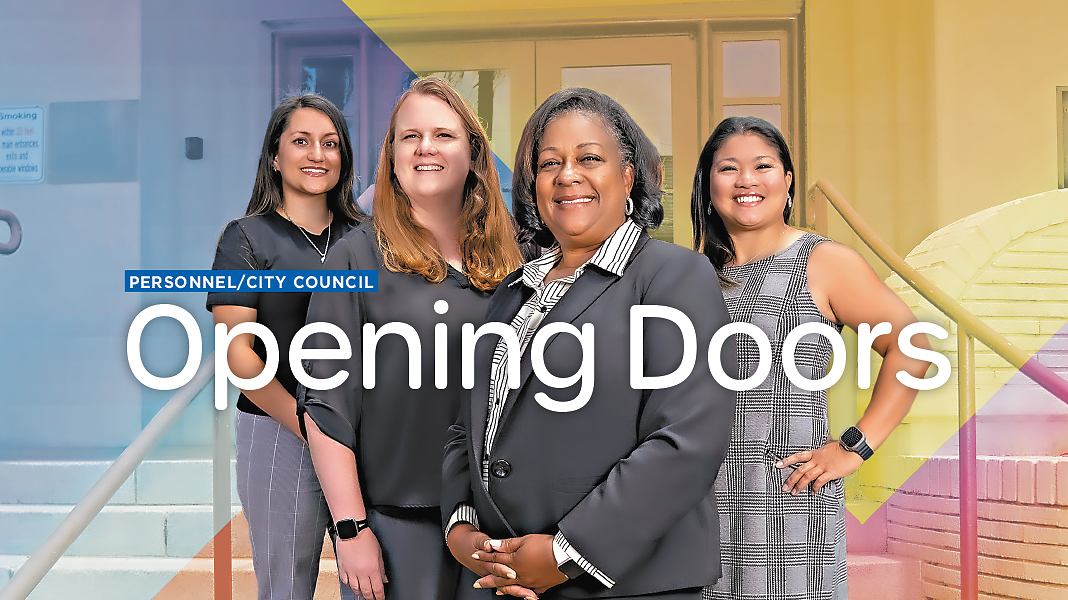
Photos by Summy Lam, Club Chief Operating Officer, and courtesy Personnel
A
n issue documented during the COVID-19 pandemic has been turned into an innovative program for the advancement of women in City government.
Personnel’s Women’s Management Academy, co-sponsored by Council District 6 and Councilmember Imelda Padilla, offers an eight-week intensive course for selected women City employees designed to increase the knowledge of the City’s budget processes, contract procedures and negotiations as well as program management, program development, and other skills to close the gender gap within the City’s management. The Academy, which began in 2022, is scheduled once a year. The 2025 session is being planned.
The Academy is open to women in all City departments. Generally, one woman per department is nominated for the Academy each year by her General Manager or Supervisor. All City departments are touched by the Academy.
The Women’s Management Academy was created in response to the City Council’s efforts to address the impact of COVID-19 on working women. A survey managed for the Council by Personnel indicated a gender gap in City employment.
The Club thanks Dana Brown, General Manager, Personnel; Stephania Hernandez, Personnel Analyst; and Jessica Taylor, Sr. Personnel Analyst I, who manage the Women’s Management Academy, for their time and effort helping Alive! tell the story
of this important project.
The Club thanks Dana Brown, General Manager, Personnel; Stephania Hernandez, Personnel Analyst; and Jessica Taylor, Sr. Personnel Analyst I, who manage the Women’s Management Academy, for their time and effort helping Alive! tell the story of this important project. •
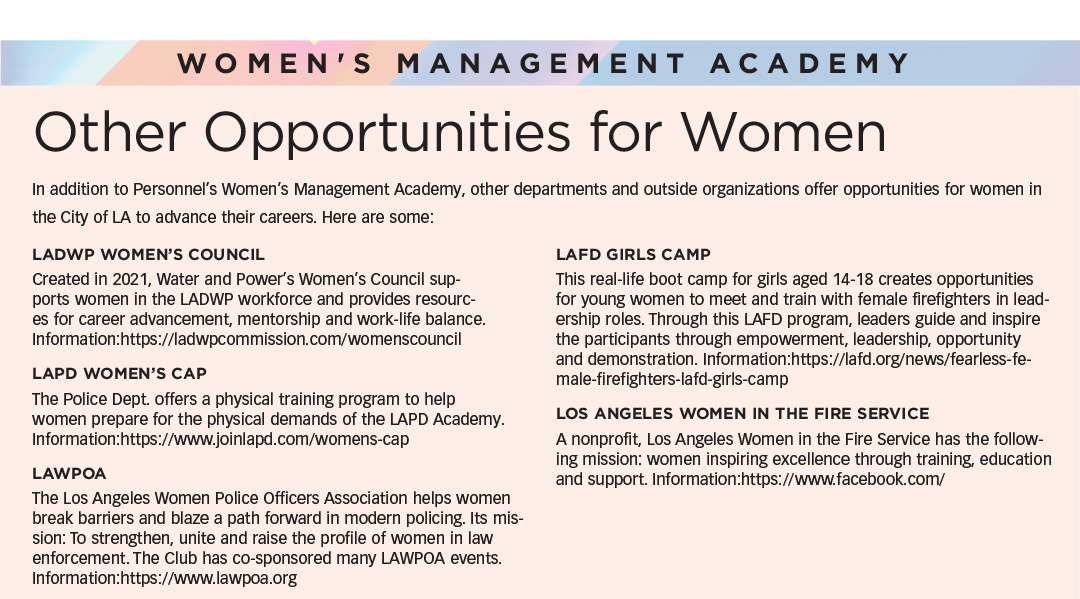
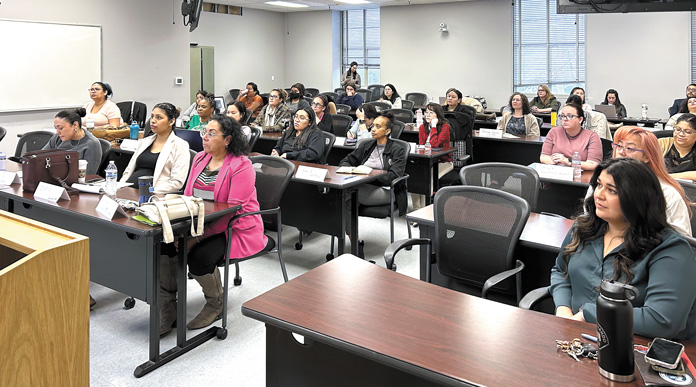
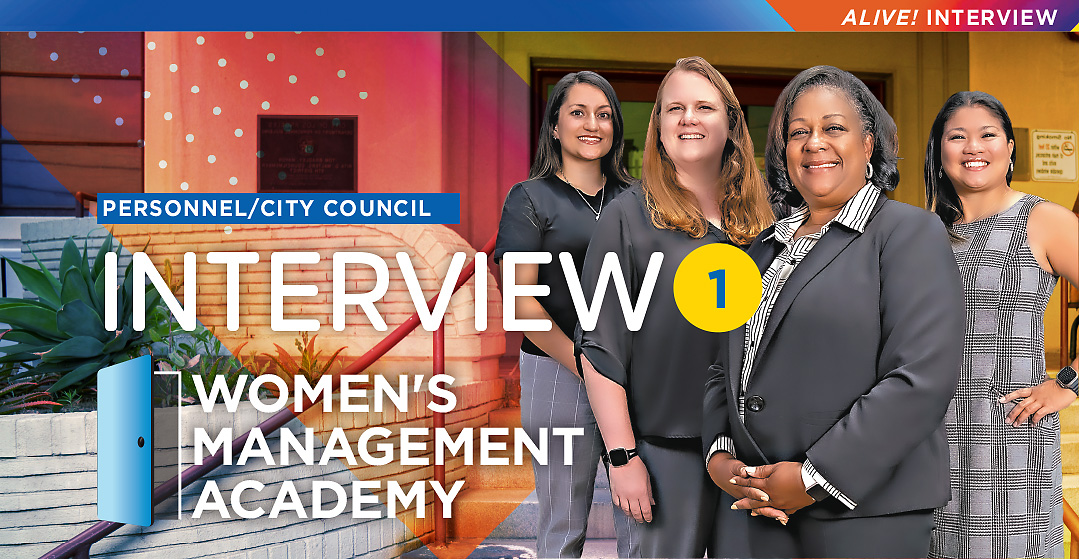 ‘Career Boot Camp’
‘Career Boot Camp’
On June 27, Association CEO Robert Larios and Alive! editor John Burnes interviewed the administration team that created and manages Personnel’s innovative Women’s Management Academy. They are: Dana Brown, General Manager, 37 years of City service; Stephania Hernandez, Personnel Analyst, five years; and Jessica Taylor, Sr. Personnel Analyst I, nine years. Separately, Alive! interviewed Councilmember Imelda Padilla, Council District 6 and Academy co-sponsor, and wove her answers into this interview. • The main interview took place via Zoom.
Hi everyone, glad you’re joining to talk about this important new program. First, let’s talk about how you got to your present position. Dana?
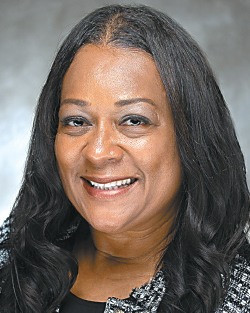
Dana Brown: Thanks for having me. I have been with the City since 1987. I started as a Clerk Typist at the Fire Dept. I was in college at the time going to school full time and working full time. My mantra was to take every City exam there was. So consequently, I have been in roughly 14 civil service classes in nine departments. Some departments I’ve worked in more than once like Airports, Animal Services and CAO. The longest assignment I’ve ever had was at the LA Zoo as their HR Director. I’ve also worked at Building and Safety, City Clerk and LAPD. I’ve worked at a lot of places.
You have!
Dana: And it’s so ironic that even though I’ve been in human resources since 1999, I have never worked at the Personnel Dept. until now. My first assignment I’ve had at Personnel is as its General Manager.
You’ve seen the ways different departments manage.
Dana: Of course. As well as their culture. I’ve worked in some places with interesting cultures.
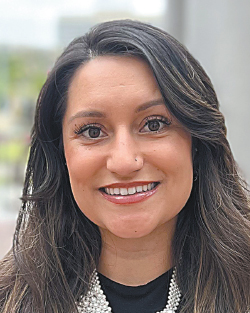
Stephania Hernandez: I worked a variety of odd jobs during college, but I was always interested in HR. And specifically, I was interested in employee training and development. My first opportunity with HR was when I started with the City five years ago as a Management Assistant. That’s a really wonderful career track because it can take you all over the City, but I was lucky enough to start off with Personnel. I originally worked in Client Services as a Personnel Liaison where I performed HR Generalist work for the Department of Animal Services. About three years later, I promoted to Personnel Analyst and transferred to my current role with the Employee Engagement and Training team.
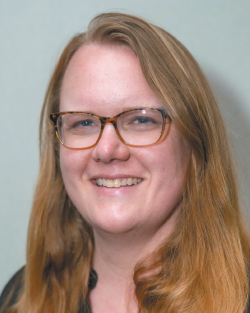
Jessica Taylor: I started with the City in 2015 as an Admin Intern for the Examining Section of the Personnel Dept. I was looking for an internship while I was getting my Master’s degree in Industrial Organizational Psychology. After I was an intern for a couple of interested, much like Stephania, with the employee development and training component, so. I took that opportunity to move to the engagement and training section.

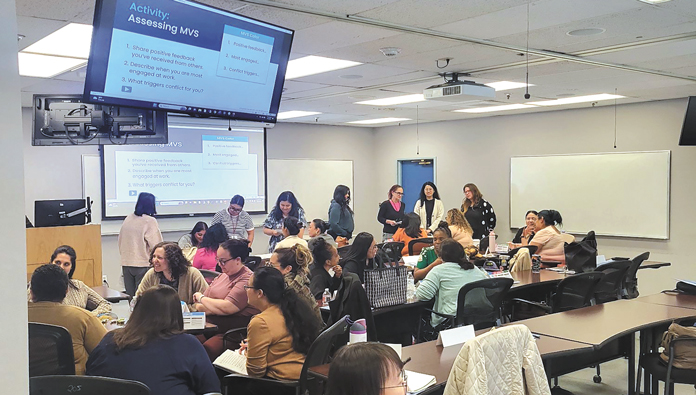
The Academy
Describe the Women’s Management Academy. What is it?
Dana: The Women’s Management Academy is a career development program designed to empower women who work for the City to prepare for leadership opportunities. It increases their knowledge of various skills necessary for becoming a successful manager. The Academy is an eight-week program. It consists of half-day sessions where participants learn from a variety of subject matter experts, network with each other, and participate in group activities related to the curriculum. It’s like a boot camp for mid-level civil servants who are able to come in and get a barrage of information from the various areas of City leadership in one place, so that they can use it to kind of hone their skill sets, and set them in the direction of advancement within the City of LA.
Stephania: It’s more than just sitting and listening to lectures. Like Dana said, it’s a boot camp. The participants are doing a variety of activities, and having discussions. It’s an interactive, immersive experience.
Jessica: Right. It’s a very interactive course. We want to make sure we give as much information as we can, and have some fun, too.
 Support and Development
Support and Development
Councilmember, how did you get involved in this project?
Councilmember Imelda Padilla: I have a background working on policies and programs to empower women and girls, such as LA County’s Women and Girls Initiative, which identifies systemic barriers to gender equality. In 2022, the Personnel Dept. partnered with Council District 6 to create the Women’s Management Academy. Upon being elected into office, I got involved with the project as soon as I learned about its existence and its impact.
Why is it something you wanted to support?
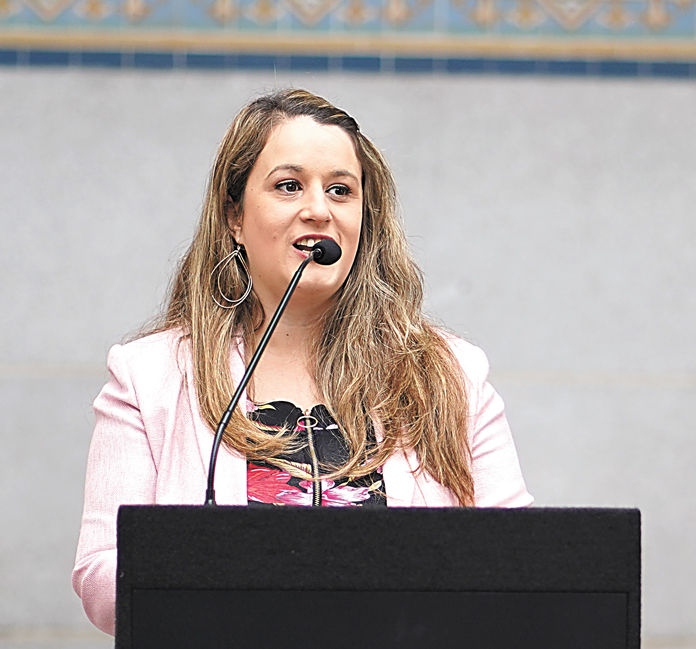
Imelda Padilla: I have been a long-time advocate of empowering girls from underserved communities to achieve their highest potential. Early on in life, I experienced the benefits of meaningful mentorships and educational programs that empowered me to pursue my full leadership potential. So when I joined the City Council, and I was invited to speak at the 2023 Women’s Management Academy cohort graduation ceremony, I immediately knew this was the kind of program I wanted to support.
It’s that important.
Imelda: Yes. Women are often underrepresented in leadership roles, despite being as equally qualified as their male counterparts. We can address this gender leadership gap by empowering and advocating for women through mentorship and sponsorship programs tailored to women leaders to have the support and guidance to achieve their full potential as leaders in the workplace and beyond. That’s exactly what the Women’s Management Academy is doing for women employees at the City of Los Angeles who want to break that barrier.
How was the Academy developed?
Dana: It started back in 2022, prior to Councilmember Imelda Padilla joining the Council. It was inspired after a completion of a survey related to COVID-19’s impact on women in the workplace. Even though the survey was meant to assess the impact on women, we realized that women noted that they felt like they did not have as many opportunities, such as promotions or places to talk about their concerns, and so forth. That’s something that Council District 6 was very interested in. They sponsored the first Academy session. Even with the change in leadership, the District has continued to support the program ever since.
Whose idea was it to produce the initial survey?
Jessica: Personnel did a few surveys during the COVID-19 time, some related to personnel engagement, others related to COVID’s impact on women. Dana and other leaders at the department thought it was important to assess those situations at the time. The surveys focused mainly on COVID, but we were looking beyond that – we were looking at the impact on women. It turned into the Women’s Management Academy.
What did the surveys indicate to you about the roles of women in the City?
Jessica: Like Dana mentioned, when it came to opportunities, women felt they had a little less access to them. The survey found that more women than men noted that they felt like they didn’t have a place to talk about their concerns and missed out on opportunities in the City.
What outcomes do you hope it achieves?
Imelda: I would hope that in the next generation, we can say this academy empowered women to be their own advocates and reach their full potential based on this program – closing gender in the City of LA.
 Application Process
Application Process
How do employees get access to the Academy? Do they apply? Are they nominated?
Dana: They’re nominated by their General Manager. We ask General Managers from each department to nominate a participant and give that person full clearance to participate in the half-day sessions.
Stephania: The program is available to all City employees, but we ask General Managers to nominate just one from each department. In preparation for the Academy, we reach out to all the GMs to share some information about the program, in case they’re not already familiar with it, and ask them to nominate any (one) employee who they think would benefit from the program. I’m sure each department has its own internal process of how they select the candidates, but ultimately the GMs select a nominee and submit their information to us.
How does the funding work now? I know the CD6 funded the first year, right?
Dana: Yes. It’s now become a line item in the Personnel Dept.’s budget.
How many take part per year?
Dana: The City has about 44 City departments. The first cohort had 39 graduates and 37 in the second cohort. And 35 completed the program during the third cohort a few months ago.
Jessica: We’ve had 111 graduates so far in the program.
Dana: We get pretty good participation from the departments, but not all departments send someone. When you think about some of the larger departments, for example, like Airports, it’s difficult for them to narrow it down. This last time, we got two participants from one department, but that General Manager asked for that and so we were okay with that. Larger departments have a hard time being fair. It’s a great benefit and a great opportunity for someone, but the struggle to be fair means that sometimes we have departments that don’t participate.

If women are interested in this for their careers, do they mention it to their supervisors? Or is it supposed to be something that General Managers do on their own?
Dana: I can speak for myself as a General Manager, because I also have to nominate someone. I put thought into it; I’m looking at where they are in their careers, to make sure that there’s a return on the investment and not necessarily sending anyone who is openly discussing retirement, for example. There are some employees who really show that they are interested in going as far as they can, and being as productive as possible in every assignment that they have. For the first few years, I asked my Assistant General Managers to nominate somebody from their group. And then I chose from that pool.
Are you on track for getting the numbers you were expecting?
Jessica: We’re on track. Ideally in a perfect world we’d like to see participation from all departments, but we understand departments cannot always afford to send someone to a program like this. We’re still early in our development and our hope down the road is to expand the program a little bit more. Unfortunately it is challenging to expand in the near future as we also oversee other large training programs that require our attention.
Is this the first time a program like this has been offered by the City?
Jessica: To my knowledge, this is the first women’s management academy, but we do have other training programs. Stephania oversees the core supervisory training program, which is similar and available to a much larger group across the City.
Dana: Police and Fire have their own leadership academies that are fashioned after the West Point programs. I am a graduate of the Fire Dept.’s Leadership Academy myself. They exist, and I didn’t work at the Fire Dept. at the time that I was a part of that program. If they have space, they invite people from outside of their department to participate. And I participated when I worked at Airports.
 Curriculum
Curriculum
What is the curriculum, and how did you develop it?
Dana: The curriculum was developed by the Personnel Dept., and it was approved by City Council. We created a curriculum that included topics that were relevant to City functions – contracts, procurement, the structure of the City’s budget, and so forth. And then we also included topics that are not as often taught, softer skills like coaching and engagement and leadership. And then, of course, the staff uses the time between presentations to facilitate activities and foster active discussions on topics like communication and knowledge transfer. We definitely have a core curriculum that begins with the structure of the City, which I present.
Are the sessions taught by Personnel employees? Or do you look into other departments and get the best of the best?
Dana: We go into other departments and get the best of the best. Absolutely.
Not that Personnel wouldn’t be the best of the best, of course!
Dana: To discuss the City’s budget we get a CAO manager, if not the CAO himself, or one of his Assistant General Managers. We get subject matter experts.
Where do you hold it? Where is your campus, so to speak?
Dana: The last couple of times, it was at the Fire Academy’s Frank Hotchkin Memorial Training Center.
Jessica: The first time was online because of COVID restrictions.

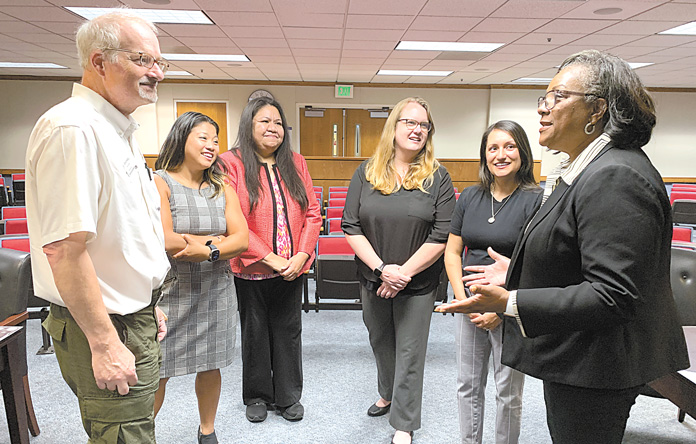
Lessons Learned
Through presenting the Academy, what have you learned about the roles and the experiences of women working for the City of L.A.?
Dana: I have learned that this kind of training is very much needed. The employees who are a part of it are excited to be a part of it. Initially I wasn’t sure how many people would be interested in attending. But I’ve learned that people are really thirsty for more information and a more comprehensive understanding of the way that the City works. It is so much easier to do your job if you know how the bigger machine is run. I learned that there is a large appetite for this information already out there.
Stephania: I’ve noticed that people are really interested in getting to know more about what other departments do, and just networking in general. City employees might feel siloed in their units, and they don’t really know a lot about what’s going on in other departments. Or maybe their own department is so large they don’t know what’s going on even in other departmental divisions. It’s been really cool to see in those classes how interested everyone is to learn about different areas and functions in the City. It’s also been encouraging to see how engaged these employees are. Like Dana said, there definitely is a thirst for knowledge. I think we might see a lot of employees who don’t seem to be very engaged or don’t appreciate the training efforts that we offer. But there are very many who are, and they’re into it; they are excited for these opportunities; they’re honored to be nominated; and by the end of the program, they’re raving about it and telling us how grateful they were for the opportunity.
Jessica: Definitely similar to what Dana and Steph have already said. But for me, one of the biggest things I’ve noticed is the importance of the in-person interaction for these types of programs. After COVID, there have been a lot of discussions on working virtually versus working in person. Various discussions can be had. But when it comes to actual development programs and training components, and learning and getting together, we’ve noticed a huge difference from that first cohort that was virtual, versus these last two cohorts that were in person. We get a lot of thanks from our users, that they’re so happy to get into a different environment and interact with people face to face. Not only are they gaining knowledge, but they’re also gaining relationships. That’s important for a program like this to be successful.
Stephania: I want to add that this seems to be a safe space for the women who are participating in the program. The conversations that we’re having, I don’t believe are happening in the workplace; they’ve shared that with us. Some women don’t feel comfortable talking about some of their experiences or concerns at work. But we’ve created a safe space to be vulnerable and discuss some of the experiences that are unique to being a woman or female employee in the City. It’s been really rewarding to know that we’re creating that comfortable environment for them.
Is this a model for other cities to follow?
Dana: Absolutely. Any other large city should consider having a similar program so that employees can know how their city operates. As far as I’m concerned, Los Angeles leads the way on so many things, this being just one of them.
Jessica: LA is always a model.
Please share with us a few stories that moved you about being involved in this project.
Stephania: Because the program is available to all employees, we have a very diverse group. Some are newer to the City while others have been here for many years and are already managers. A common theme that I’ve seen over the last couple cohorts is that a lot of the long-timers wish this program was available to them when they were younger. They shared some unhappy memories of their experiences back when they first started with the City and expressed that they may not have struggled in their career path if this program was available when they were early in their City career. They shared that it’s great to now see that the City and Personnel care about women in the workplace. It’s been really touching to hear how much the program participants value the experience that WMA offers.
Jessica: During the third cohort in particular, a lot of the discussion was just sharing experiences and different things. Some emotions showed up through a couple of our participants. Having that safe space has been really eye-opening and moving for us. And to mimic what Steph just said, hearing and seeing how grateful everyone has been is also moving. The second cohort made a little thank-you program where they all individually wrote messages for us – thank you for the program, thank you for what you did. Obviously, they don’t need to do anything like that and we don’t expect anything like that from them. It was a very sweet surprise at graduation.
Dana: As I start the sessions, I always say, I wish there were something like this for me. I had to work 14 civil service classes in nine departments to get what you’re going to get. So I definitely agree with that.
Also, one memory that stands out is one of the people in the first cohort ended up being an Interim General Manager with the City. She was not the permanent appointee, because she wasn’t interested in that. But it speaks volumes that she was able to take on such a role for her department while they searched for a permanent General Manager.
Imelda: I got to meet several of the participants in the latest cohort, and one common theme expressed by all is how much they enjoyed meeting women from diverse departments and learning about their distinct roles, and finding similarities as well. It was refreshing to hear women from different departments discuss how much they enjoyed learning about each other’s work and creating new support networks as they continue to navigate their career journeys.
 Passion for People
Passion for People
What do you love about what you do?
Jessica: I love engagement and training. Unfortunately, training and employee development kind of takes a backseat for a lot of departments in the City. Everyone’s very busy, so it’s hard to encourage people to do the extras of participating in training programs, whether it be the Women’s Management Academy or online training, whatever the case is. I love working in this group and determining what opportunities we can give people that are easier to access. I like figuring out the ways that we can make employee development seem a little bit more fun and engaging for people so they don’t feel like it’s just another training they have to take. I like having that kind of challenge. And I think that’s important for us to continue to boost employee development across the City.
Dana: What I love most about my position is that I have a platform with a large audience, and people see themselves in me. I consider myself a very relatable person. In my City experience, I’m somebody who has failed a civil service exam. I’m somebody who took an emergency appointment and wasn’t reachable. People can relate to me. They believe that they can achieve whatever they want because I’ve done it. I came from being a Clerk to being a General Manager. I love my journey. I wouldn’t change a thing.
Stephania: I love being part of the team that is dedicated to finding ways to encourage employees to develop. We spend so much time at work, and it’s easy to get lost in the busyness and feel burnt out and all of that. We’re trying to bring job satisfaction and make everybody a little more fulfilled. I love being a part of that. Working on the Women’s Management Academy is how it’s connected us with so many other women in the City. I didn’t even know their name until the Academy. There is totally that camaraderie there. A lot of people have kept in touch. I just think that’s really awesome.
Imelda: I love working with my team to improve the community that I grew up in. As a lifelong community organizer dedicated to improving the quality of life in my District, it is a great privilege to now represent the community that I grew up in. I am grateful that I get to wake up everyday knowing that my efforts are now going toward advocating for the City resources and services my neighborhoods deserve to thrive.
Are you changing lives?
Stephania: I was just telling Jessica the other day, I think that at the graduation for the last Academy, someone literally came up to me. We had a vulnerable moment talking about how much the Academy meant to her. And she specifically said this Academy changed her life, and she was so grateful for it. It made me emotional, because the people taking the program really appreciated it. I’ll never forget that conversation.
Dana: We’re in the business of changing lives. The Personnel Dept. is committed to changing lives for the better, for sure.
Imelda: I definitely heard it from the women in this year’s cohort, who expressed feeling more confident and empowered. I applaud the Personnel Dept. for taking a difficult time such as the COVID pandemic that deeply impacted all workers’ lives, and not only identifying a leadership gender gap issue, but launching a program to address the problem of women not having enough opportunities for advancement, promotions and preparation for civil service exams. I firmly believe that when more women are empowered to lead, everyone benefits.
Jessica: Personnel plays a huge part in people’s lives in general, whether it be helping someone start their career with the City, or just brightening people’s day. Just within the Personnel Department, our group sends monthly email blasts to remind employees that they’re important, can take the time to reset, and acknowledge the work they do, as we know work can be stressful at times. We think those mental check-ins with staff are critical.
 Full Steam Ahead
Full Steam Ahead
I presume you’re looking at continuing the Women’s Management Academy and making it stronger and better.
Jessica: Yes, for sure. We definitely want to keep the annual program going. CD6 is always in support of us and wants us to move forward with it as well. Full steam ahead.
Imelda: I am very proud of the City of LA’s Women’s Management Academy, and my office is excited to support it and continue funding its success.
Stephania: We’re already in communication with CD6 on confirming the curriculum for next year, and talking about timelines and plans for next year.
We’re really lucky and grateful that we have Dana and CD6 supporting this program, because with them, we were able to get this Academy kick-started and keep it going from there.
Great to hear. Dana, Stephania and Jessica, thank you for your time today and for all that you do for the City.
Stephania: Thank you.
Jessica: Thanks!
Dana: Thank you! ••
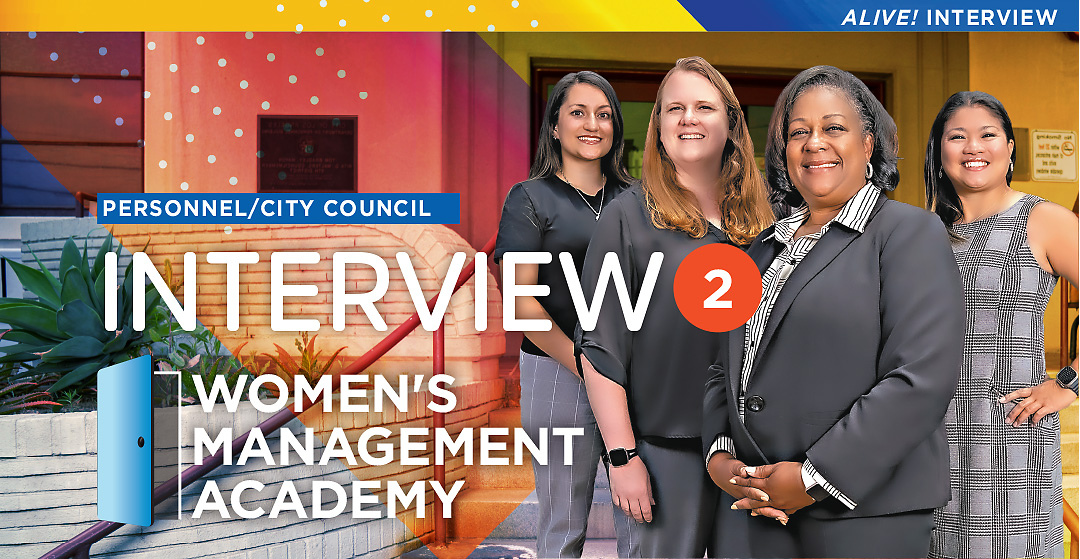
‘What the Graduates Say’
On July 2, Alive! editor John Burnes interviewed three graduates of the Women’s Management Academy about their experiences in the program – Guadalupe Lopez Torres, Administrative Coordinator II, 25 years of City service, Club Member; Aimee Sevilla, Administrative Coordinator II, 18 years; and Rosa Contreras, Administrative Coordinator II, 10 years, Club Member. All work for the City Attorney’s Office and attended the Academy in different years. • The interview took place via Zoom.
Thanks for joining us today to talk about your experiences attending the Women’s Management Academy. But first, tell us the path you took to your current position.
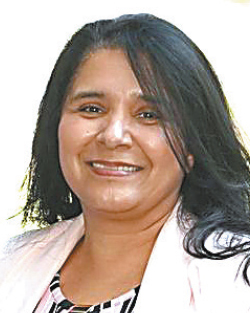
Guadalupe Lopez Torres: Sure. I joined the City Attorney’s Office in 1999 with 10 years of administrative experience in the private sector. I started as a Legal Clerk in the press office. A year later I was promoted to Legal Secretary I/II in the Criminal Branch assisting with the MCLE programs and the Chief of the Criminal Branch.
In 2005 I was promoted to Legal Secretary III and transferred to the Municipal Branch and was there for almost 14 years, with the Land Use and Real Property Divisions that handle cases in superior court, federal court, state and federal court of appeals and City’s Ordinances. Also, during my 14 years there, I was one of the presenters of a series of training sessions for staff interested in the civil litigation work of our office.
In 2019 I transferred to the Civil Branch with a promotion as an Executive Legal Secretary and served as such for the City of Los Angeles Claims Board, in addition to assisting the Branch Chief and Assistant Chief. During my time in the Civil Branch, in collaboration with other colleagues, I established a series of group and individual training sessions that included the preparation of various administrative forms, format and approval process of all confidential settlement reports submitted for Claims Board or Council approval, and federal court filings. In 2022 I was promoted as an Administrative Coordinator II, to my current position with the Budget and Finance Division in the Liability Claims section.
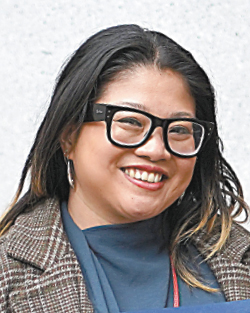
Aimee Sevilla: I started in the City as a Legal Clerk, too, back in 2006. After a year or so, I was promoted into an Accounting Clerk in the same division. I started at the business office of the City Attorney, Budget and Finance. I was there for about 12 years. I applied and then was a Legal Secretary for only a few months until there was an opening in the outside counsel unit of the Budget and Finance division. I applied to it, and the rest is history. I’ve been with the Outside Counsel Oversight Unit since 2018.
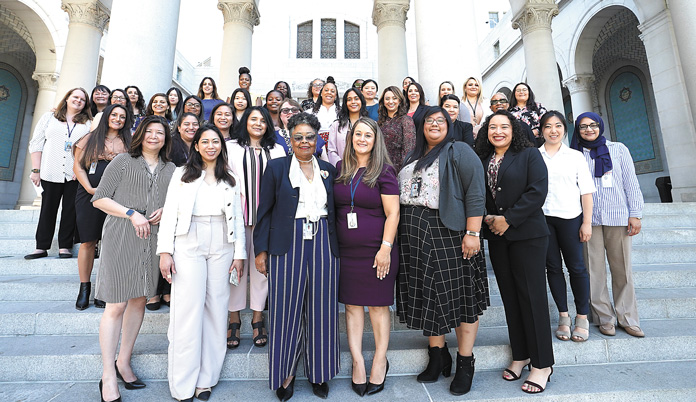
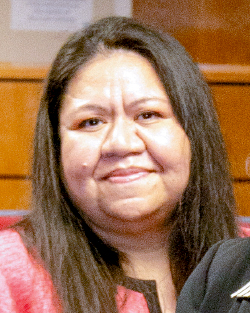
Rosa Contreras: Things sort of lined up pretty well for me. I earned my Bachelor’s degree in American studies from UC Santa Cruz. While at UC Santa Cruz, I worked in Student Development, and I continued in that field even after returning to Los Angeles. I began to work for a temp agency and was hired by a Lockheed subsidiary, and was offered a job in operations and leadership development worldwide. The company moved to the East Coast, and with severance pay and my savings and unemployment, I volunteered for 14 months at a pro bono law firm. That was the key to opening the doors at the City Attorney’s office. I helped immigrants who were victims of crime, including trafficking and labor victims, which exposed me to the different work that was being done at this pro bono law firm. I was hired at the same firm to do public benefits advocacy and also work with the L.A. County Homeless Court program. That’s how I connected with the City Attorney’s office. When the hiring freeze was lifted in late 2013, I applied and was hired as a Legal Secretary for the Neighborhood Prosecutor Program, which the former City Attorney, Mike Feurer, was trying to beef up again. Within a year, I was promoted to Administrative Coordinator with the Neighborhood Justice Program. After that, I was asked to step into the Prostitution Diversion Program since the Supervising Attorney was scheduled to retire within weeks. After the L.A County Homeless Court program, I ended up coming to the City Attorney’s Office 10 years ago. Now I’m back with the L.A. County Homeless Court Program at the City Attorney’s Office under a county grant.

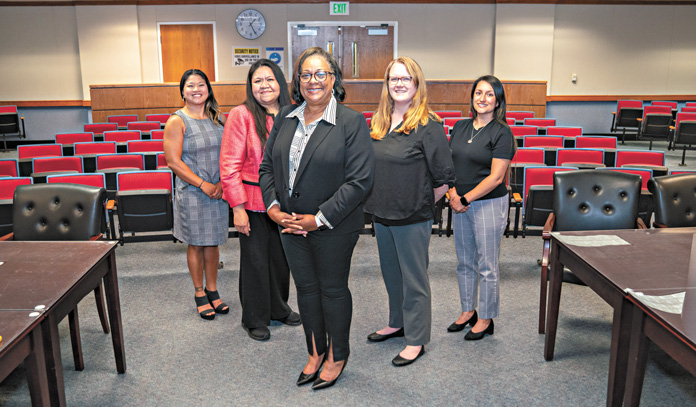
Part of a New Program
All three of you took part in the Women’s Management Academy. Had you ever heard of it before being nominated?
Rosa: No. I was part of the inaugural group. The first time I’d heard of it was when the former City Attorney, Mike Feuer, sent an office-wide email with the eligibility criteria and detailed the process. The challenging part for me was that, at that time, the unit that I had just joined did not have a Supervising Attorney. I had to figure out a way to advocate for myself without a supervisor. I had to push to make it happen.
Guadalupe: I attended the year after Rosa attended. We didn’t know this program was going on in Council District 6 until Rosa attended. At the time, I was a board member for the City Attorney’s Women’s Association. Many people had expressed interest. And the following year with our new administration, there were a lot of changes. The invitation to attend was extended by my supervisors – managers determined who might benefit from the program. I was definitely taking on higher responsibilities covering for our financial manager in the office. I thought the invitation was perfect. Immediately I was excited to be given the opportunity to attend.
Aimee: I first applied in 2022, but I wasn’t selected back then. But as of this past February, I got an email from HR that I was selected for the training. I read through the program and it was exciting.

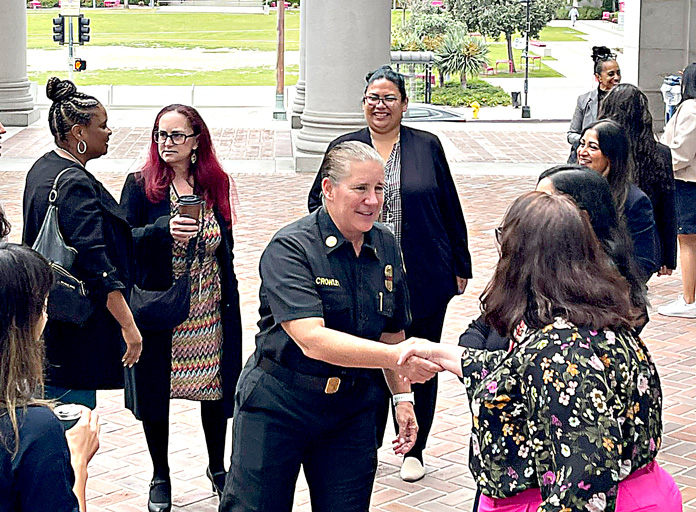
Lessons
What did you learn?
Guadalupe: Communication. They presented with various exercises of communication, and it’s one of the things that I strongly believe when training or supervising others – you have to be able to communicate clearly and also be able to listen for any feedback.
Aimee: One of the focuses of the training was contracting, which is in line with my tasks. I was able to connect with different departments that are involved in contracting procedures for the City, like the Office of Procurement with CAO, the Bureau of Contract Administration, the Ethics Dept., and the City Clerk. I was able to create connections with people from different departments who will be helpful in my tasks.
At the same time, I met a lot of great women in the City. There was Dana Brown [GM of Personnel] and Fire Chief Kristen Crowley, who were very impressive. The best part of the training involved connecting with colleagues a year after COVID, while there were a lot of different changes in our hybrid working environment. Everything was being done virtually. We were sharing ideas on how we were doing things in our department, how we were maintaining camaraderie and morale without seeing each other in person. We were coaching each other on how to navigate the new workplace.
Rosa: For me, honestly, it felt like a crash course on all things City government. It was overwhelming because I’d never taken an online class. I come from a different generation where we actually showed up to a classroom. But it was the first year during COVID and the Academy was virtual. We were the training ground to see what worked. It definitely felt like, “Oh, my God, all this information is coming!” I am truly appreciative that they saved all those training sessions, so I can always go back and review them.
I’m very appreciative for the Personnel Dept.; they put a lot of work into the trainings.
I think most of all, my biggest takeaway is that there is a need to be flexible. There’s a need to be willing to be challenged in different ways. All I need to do is decide where I see myself in the future, where do I want my career to go and then work towards that. There are those networking opportunities that don’t come as easy to some of us; it’s not easy for me to connect with folks and network with people. This opportunity facilitated that networking across the City with other women, which I really appreciated. And ultimately, I’m not stuck in any position. I choose how I want to move in City government.


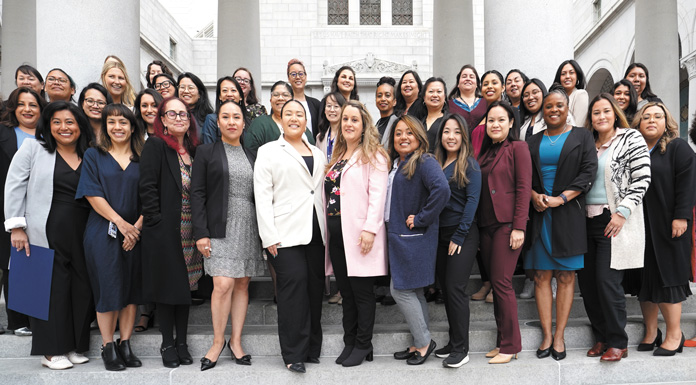
Women in the Workplace
Did the Academy address those concerns that you had about the difficulties and challenges of being a woman in municipal government?
Guadalupe: Chief Crowley shared her experiences as a woman in the Fire Dept. And her hard work, discipline and perseverance earned her colleagues’ respect. I admire her very much and she is indeed a true inspiration.
Aimee: I believe it did. I feel you are always stereotyped, not just as a woman but an Asian woman, that you are you are soft, that you are a follower. But it was very empowering to be in a room of women leaders and to make those connections, knowing that all of us have a voice. Chief Crowley, being a woman surrounded by powerful, physically strong men, was able to raise herself and be a leader. Knowing that there are individuals like that, it gives you the confidence that you can do whatever you want in City government. You can raise yourself and be a great leader.
Rosa: For me, it’s challenging not only being a woman, but a woman of color, trying to get into positions of leadership, regardless of where you are – city government or the private sector, it doesn’t matter. It’s a challenge across the board. Not only that, but if you don’t speak English the same way that your counterparts do, that’s another challenge, right? We deal with that on a regular basis. For me, it’s just par for the course. It is what it is. That’s what we deal with, and I’m used to being one of the few who voices my concerns and is vocal. I don’t know that it addressed those concerns for me because it’s everywhere. But I did appreciate being in a room full of women future leaders in City government. My peers in the inaugural group at some point will move up that ladder and be in those positions. It planted the seed of “we can do this,” and there is support out there for you.

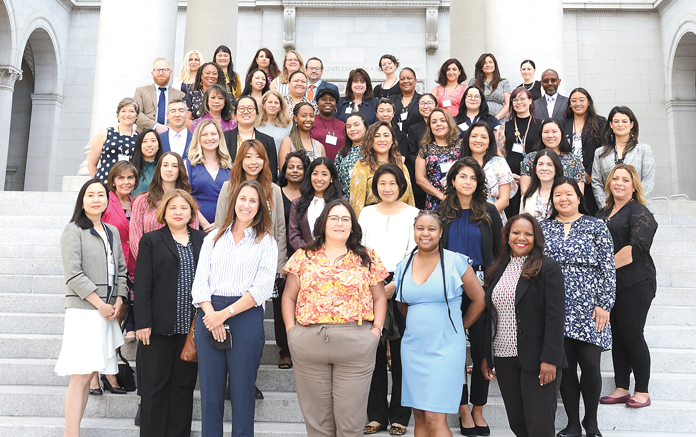
Strength for the Next Step
Did it give you confidence in what you do every day or a clear view of the future of your careers?
Guadalupe: At this moment, I’m happy and satisfied where I am, continuing to learn and grow as a professional. It was very inspirational to be in such a great group of women and what they have accomplished. They’re just an email away. It’s empowering. Definitely.
Aimee: Oh, yes. The women I’ve met in the training were able to create a chat group and an email thread, and it’s been helpful creating a network. I know these women will be people who I’m going to be working with in the next 12 years of my City life. If I need a contact for City Clerk, for CAO, I have a name in my email. And the speakers are all willing to help.
Rosa: It definitely gave a strong foundation for how the City works. But I also want to thank [the Club] and Guadalupe for facilitating this interview because it has been a reminder to me. I took the course about two years ago this summer, and it’s a nice reminder of what I was part of. It’s keeping me at a higher standard because I don’t want to disappoint my peers or the Personnel Dept. staff who put in all that time. This interview is a reminder that I was part of a larger effort and that I always need to be my best in whatever I do, regardless of what’s going on. When I choose to make those changes if I want to change my role, that it’s possible and I have the connections to do so. I’m going to reach out to my inaugural group, and say, “Hey, what’s going on with everybody?” I really want to thank you both for that.
Guadalupe: You’re welcome.
You’re very welcome, we honor you for all that you do for the City. Do you recommend the Academy?
Rosa: Oh, yes.
Aimee: Definitely.
Rosa: Oh, yes. It is definitely worth it for the knowledge that you get, the better understanding of how the City works, and how critical all these departments are to how our City functions. There was a department that spoke that I had no idea existed.
Aimee: That is true.
Rosa: If there’s an opportunity, take it. I think it should be more of an open email to everyone in the department.
Guadalupe: After I finished the program, my management asked me what I thought of it and what my recommendation will be. And I said, every single support staff Supervisor should be given the opportunity to attend. It would be beneficial to anyone who supervises a group of people. And again, I totally agree with Rosa. I think it should be an open invitation more than a recommendation. Everyone should have the opportunity to apply.
Aimee: After the program, I realized how important personal development is. If we don’t have, let’s say, the promise of increase in salary or promotions in line for our staff, at least it gives the promise of development and self-discovery. That would be very, very great.
Guadalupe, Aimee and Rosa, thank you for your time today. Congratulations on completing the Academy.
Rosa: Thank you.
Guadalupe: Thank you.
Aimee: Thanks!
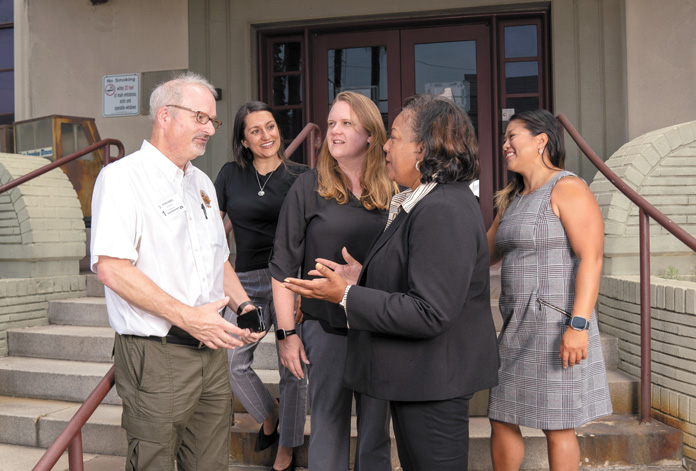
| BEHIND THE SCENES
|


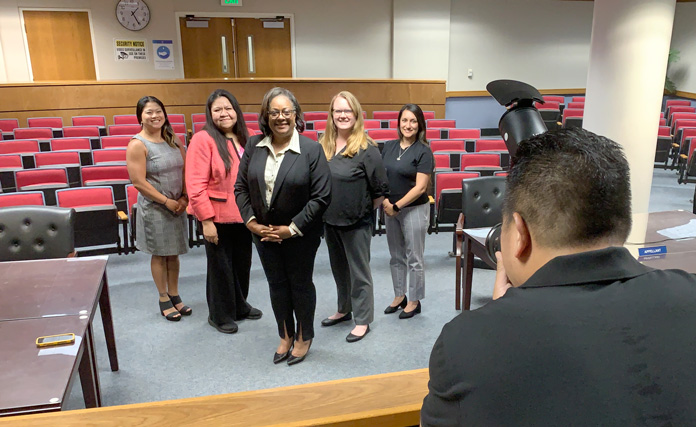 Club COO and photographer Summy Lam photographs administrators of the Women’s Management Academy Dana Brown, Stephania Hernandez and Jessica Taylor, Personnel; and Academy graduate
Club COO and photographer Summy Lam photographs administrators of the Women’s Management Academy Dana Brown, Stephania Hernandez and Jessica Taylor, Personnel; and Academy graduate 

